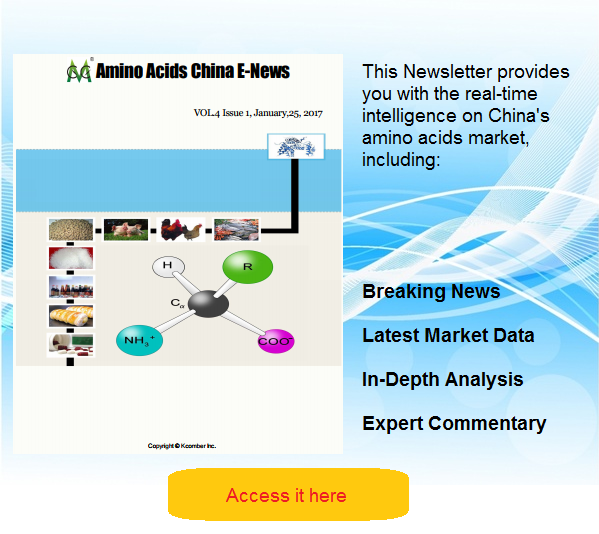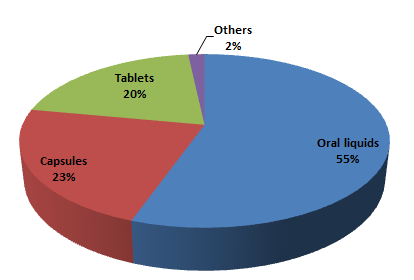Even the share of amino
acids that are used in the healthcare market is comparably small, growing
demand and high profits are driving this new business in China. However, the
market is poisoned by three main problems currently.

During
the past years, Chinese amino acids manufacturers have changed their business
focus and started to target the market of minor amino acids, like valine,
isoleucine, and glutamine. These kinds of products can be counted to the
healthcare and medicine industry. After all, the profit for producers of
healthcare amino acids is higher than the one of bulk amino acids, since they
are stated at high-grade amino acids.
However,
even the Chinese amino acids healthcare industry is growing rapidly, the market
represents still a small part of the whole amino acids market and problems are
consistent in the industry. According to market intelligence firm CCM, there
are three main problems that damaging the Chinese market currently.
First
of all, thanks to the growing living standard in China, the population is
demanding and can afford higher-quality pharmaceuticals and healthcare
products, which is pulling companies to get some of the valuable market shares.
However, some manufacturers are using dirty tricks labelling and advertising their products wrong. For example, it is
not uncommon that products do not have any official registration, or products
are labelled as clinical drugs, even they do not meet the requirements to do
so.
Furthermore,
some manufacturers have added less–than-required
contents to their products. According to the Guangdong Food and Drug
Administration, several products that were inspected in December 2017 faced far
fewer amino acids than the required amount.
For
the last point, the Chinese market is facing an occasional illegal addition of food additives. According to CCM’s
research, substandard imported protein powder was found earlier this year.
These products were substandard due to illegal use of food additive stevioside;
of nutrition enhancers (l-leucine, l-valine and l-isoleucine); and of the food
additive sodium silicoaluminate.
About China’s amino
acid market
The
increasing efforts of China’s amino acid manufacturers are based on the
optimistic outlook for the Asian market, especially the one in China, as the
country is the leading consumer. The
domestic need, especially for the animal feed industry, is going to rise about
10% to 15% in the next years, experts predict. Hence, the competition in
this promising market is attracting many enterprises in China and overseas.

Feed-grade
and food-grade amino acids are accounting for over 80% market shares of the
total, due to the huge demand for poultry and livestock raising industry in
China. However, the competition in the feed grade amino acid market is quite fierce,
when many leading producers have been expanding their capacity or upgrade
technologies.
Pharmaceutical
grade amino acids boast promising prospects, especially in the large volume
markets, owning a large demand. What's more, the demand is increasing thanks to
the fact that Chinese authorities are working on to standardise the use of the
pharmaceutical products. However, the market competition here is also very
fierce, according to CCM.
Amino Acids in the
healthcare industry
At
present, the major amino acid healthcare products in the world include compound
amino acid oral liquid, compound amino acid capsules, compound amino acid
tablets, single amino acid nourishment, amino acid powder and amino acid
drinks. The leading single amino acid products are lysine, arginine, taurine
and glutamine.
Share of amino acid healhcare products in the Chinese market 2016

Source: CCM
Amino
acid healthcare products have no absolute advantages in the Chinese industry.
Currently, the effective method of increasing sales is large amounts of
advertising, great efforts in marketing. Amino acid healthcare product has
lower awareness than vitamins, so it takes up small market share.
It
is worth noticing, that Chinese pharmaceutical economic growth is slowing down,
posing considerable pressures on manufacturers. However, the demand for
pharmaceuticals is still strong, and the pharmaceutical industry can generate
huge incomes. Under such circumstances, the
amino acid healthcare product has a promising future. The role amino acids,
for long neglected, is today gaining recognition as an important adjunct in the
healthcare section.
In
1956 was the first year when amino acids were used in the medical field after
infusions for the supply of nutrition to patients before and after surgery were
launched in Japan. During the development time in the last 50 years, they were
found to increase the surgical success rate in addition to allowing nutritional
control and are now widely used as indispensable medical products for surgery.
The
physiological function of each amino acid has been studied in depth and hopes
run high for the development of medical products using their physiological
functions. Amino acid production technology, including the fermentation method,
has made it possible to manufacture high-quality amino acids in large amounts.
This technological development has made a significant contribution to the
diffusion of amino acid infusions throughout the world.
About the article
The
information for this article is provided by CCM, China’s leading market
intelligence firm for the fields of agriculture, chemicals, food and feed.
Join
the discussion of China’s amino acids market by entering our LinkedIn and Facebook
groups.
Follow
CCM on Twitter: @CCM_Kcomber